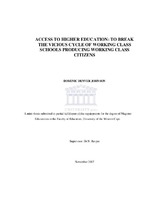| dc.contributor.advisor | Ravjee, N | |
| dc.contributor.author | Johnson, Dominic Denver. | |
| dc.contributor.other | | |
| dc.contributor.other | Faculty of Education | |
| dc.date.accessioned | 2013-10-24T09:36:32Z | |
| dc.date.available | 2009/10/23 15:15 | |
| dc.date.available | 2009/10/23 | |
| dc.date.available | 2013-10-24T09:36:32Z | |
| dc.date.issued | 2007 | |
| dc.identifier.uri | http://hdl.handle.net/11394/2339 | |
| dc.description | Magister Educationis - MEd | en_US |
| dc.description.abstract | This study investigated why learners from low socio-economic communities such as Delft, a township in the Cape Flats, fail to achieve matriculation exemption and do not meet the criteria for tertiary education admission. Using a case study approach, the research sheds light on why this is happening in one school (School X) in Delft. It was found that the crucial factors to be both internal and external to the school. | en_US |
| dc.language.iso | en | en_US |
| dc.publisher | University of the Western Cape | en_US |
| dc.subject | Higher education | en_US |
| dc.subject | Cape Town | en_US |
| dc.subject | South Africa | en_US |
| dc.subject | Access | en_US |
| dc.subject | Education | en_US |
| dc.subject | Higher | en_US |
| dc.title | Access to higher education: to break the vicious cycle of working class schools producing working class citizens | en_US |
| dc.type | Thesis | en_US |
| dc.rights.holder | University of the Western Cape | en_US |
| dc.description.country | South Africa | |

